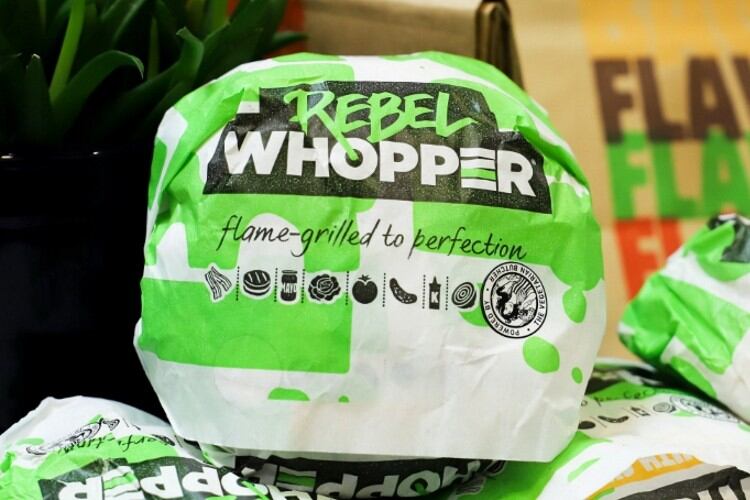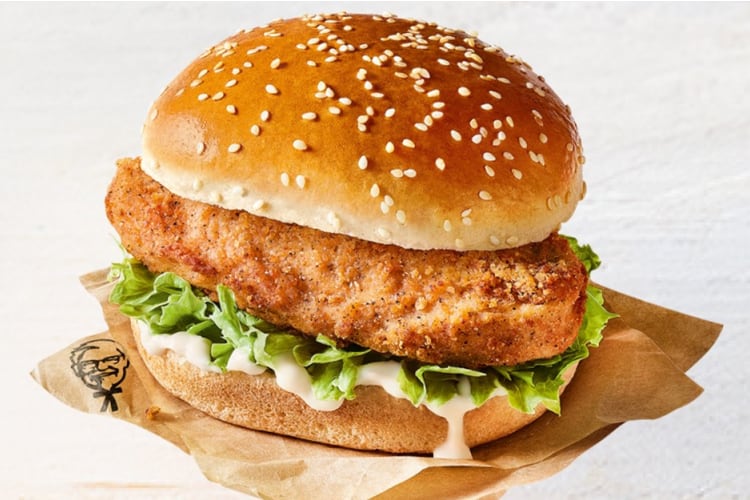Plant-based brands have seen rapid growth in retail channels over recent years. As they work to maintain category momentum, attention has pivoted to the vast opportunity presented by the out-of-home sector, from bars and restaurants to coffee shops and fast-food chains.
“Out-of-home operators are growing their plant-based offering through partnerships with retail brands moving their product into the out of home market,” Jun Sasamura, Insight Manager at Lumina Intelligence, told FoodNavigator’s recent Protein Vision event.
OOH supports trial purchase for plant-based
For Hugo Verkuil, CEO of Unilever-owned plant-based brand The Vegetarian Butcher, expansion into out-of-home is critical for the category to attract new consumers and drive trial.
“The key challenge for growth, first and foremost, is trial. To get trial you need availability. That is why we work as a butcher. We have a wide portfolio that includes every dish from dinner meat, to snacks on the go at the petrol station, to having your favourite fast-food burgers, to deli meat in sandwiches. We want to make sure we are in different channels, occasions and dishes. Then plant-based becomes mainstream,” he told his audience at the event, which focused on the development of the alternative protein space.
The Vegetarian Butcher has partnerships with the likes of Burger King, Dominos and Starbucks, who it supplies with various alt meat products from plant-based nuggets, to meat-free Peppero'NAY and fish-free Tu'NAH.

Quorn is another plant-based brand that has moved from retail to out-of-home. The company has been working in the channel for a considerable amount of time – it has been in food service since 1984 and supplied the now defunct Wimpy burger chain in the UK decades ago. But, Chief Commercial Officer at Quorn Peter Harrison revealed, ‘it is really in the last three years that we’ve gone after this channel' in a big way.
Quorn has identified foodservice and out-of-home as an important and largely untapped growth area – and one that innovation can help develop. “There is so much space in food service, so many meal occasions,” Harrison emphasised.
Recent tie-ups with QSR operators include a partnership with Gregg’s for its vegan sausage roll in the UK and a launch in KFC, with Quorn's alt chicken coated in the Colonel's secret spices now being rolled out across various European markets.
Harrison echoed the importance of expanding into new consumption occasions to support the overall health of the plant-based category. “Channel reach is really important for the category because its about availability. Being present and being available where people want to consume is important,” he told us.
Harrison agreed that out-of-home consumption can be a more accessible gateway for consumers to give plant-based options a try. “Sometimes it can be a very small price point,” he said pointing to the ‘great value’ Gregg’s sausage roll. “Sometimes people feel more willing to try new things [out of home]… It’s a great way for people to trial.”

For flexitarian appeal offer tasty treats
For The Vegetarian Butcher’s Verkuil, expanding in settings like a burger chain is about broadening the appeal of plant-based offerings and on-boarding meat-eating consumers. “We want to excite meat lovers. We want to be where meat lovers are. That's why we are so actively going after these channels... The Burger Kings, the Dominoes, etc, are where meat lovers go. We meet them there with our plant-based alternatives.”
Little wonder that plant-based brands are targeting erstwhile carnivores. While the number of shoppers who identify as vegan or vegetarian remains a small niche, a growing number of people are trying to incorporate more plant-based foods into their diets. For example, a recent survey of 7,500 people across ten European countries – part of the EU-funded Smart Protein project – found 7% of respondents follow plant-based diets, while 30% of people identify as flexitarian eaters.
Lumina Intelligence menu tracking data highlights this shift towards flexitarian consumers, with products like salads falling out of favour and burgers that deliver a meat-like taste experience rising up the menu charts.
As plant-based innovators look to capitalise on this growing cohort of diners, Sasamura said it is important to be aware of a key consumption driver in out-of-home, particularly post-pandemic. This, he explained, is consumers seeking out treat occasions.
“Post COVID, consumers are using out-of-home as more of a treat than they would have versus in-home, highlighting the need and growth potential for plant-based products to be seen as a treat occasion for consumers who are broadly of the flexitarian,” the trend expert explained.
Products like burgers, which have increased in popularity, tick the ‘treat’ box. At the same time, being plant-based, they benefit from the general health halo that surrounds the category. While consumers want something that delivers on taste, 'lots of people still want something that's slightly healthier', Quorn's Harrison suggested.

Unlocking value and values
Bringing more flexitarians into plant-based is a core growth driver. "As flexitarian dietary trends are set to continue to grow there is significant value to be had by focusing on these consumers,” Sasamura told his audience. “As this group isn't strictly plant-based we will see more demand for plant-based dishes that don't suffice taste and present good value compared to meat dishes.”
How are plant-based producers delivering 'good value'?
Particularly in a period when we are seeing food prices rise and living standards squeezed – conditions where out-of-home sales are likely to come under pressure – value is very closely aligned with price. Can plant-based maintain its momentum in out of home when it often commands something of a premium compared to meat alternatives?
Verkuil conceded this is an issue plant-based manufacturers need to grapple with. “Lots of consumers are struggling. That's a real challenge that we should acknowledge and make sure we are offering the right solutions. One of the key opportunities we see is in affordability in plant-based meat. There is still a gap in affordability between plant-based meat and animal meat. Although that is very rapidly coming to a parity, much quicker than we thought two years back. That parity is coming closer,” he told the audience.
“What needs to happen is the maturing of the industry to get more scale. Many food categories have existed for decades - sometimes hundreds of years - and have created lots of efficiency over time. We are a relatively young industry still so there is lots of opportunity to get efficiency both in the way we design products, the way we manufacture products, but also further down the chain to have scale in ingredients. I expect over time, the cost base should come down. That's what we are after, to make sure the adorability level ultimately is at least at par with animal meat.”
Value can also be about delivering values - and sustainability-minded consumers and customers in the out of home sector are focusing in on this issue, Quorn's Harrison added.
"What we've found really emerging strongly in food service is the drive towards sustainability. A lot of the operators within the channel are looking for sustainable ways to feed their customers... Sustainable plant-based products are something they want to be able to offer their customers and clients as a different way of thinking about food."
Missed Positive Nutrition 2022? Don't worry, all four sessions profiling innovation and growth opportunities in alternative meat and dairy are available on demand. Simple register here and view at your leisure!




